How 'Rich' Nations Are Actually Poor
Climate debt gives places like the US, Europe, and Australia a negative net worth
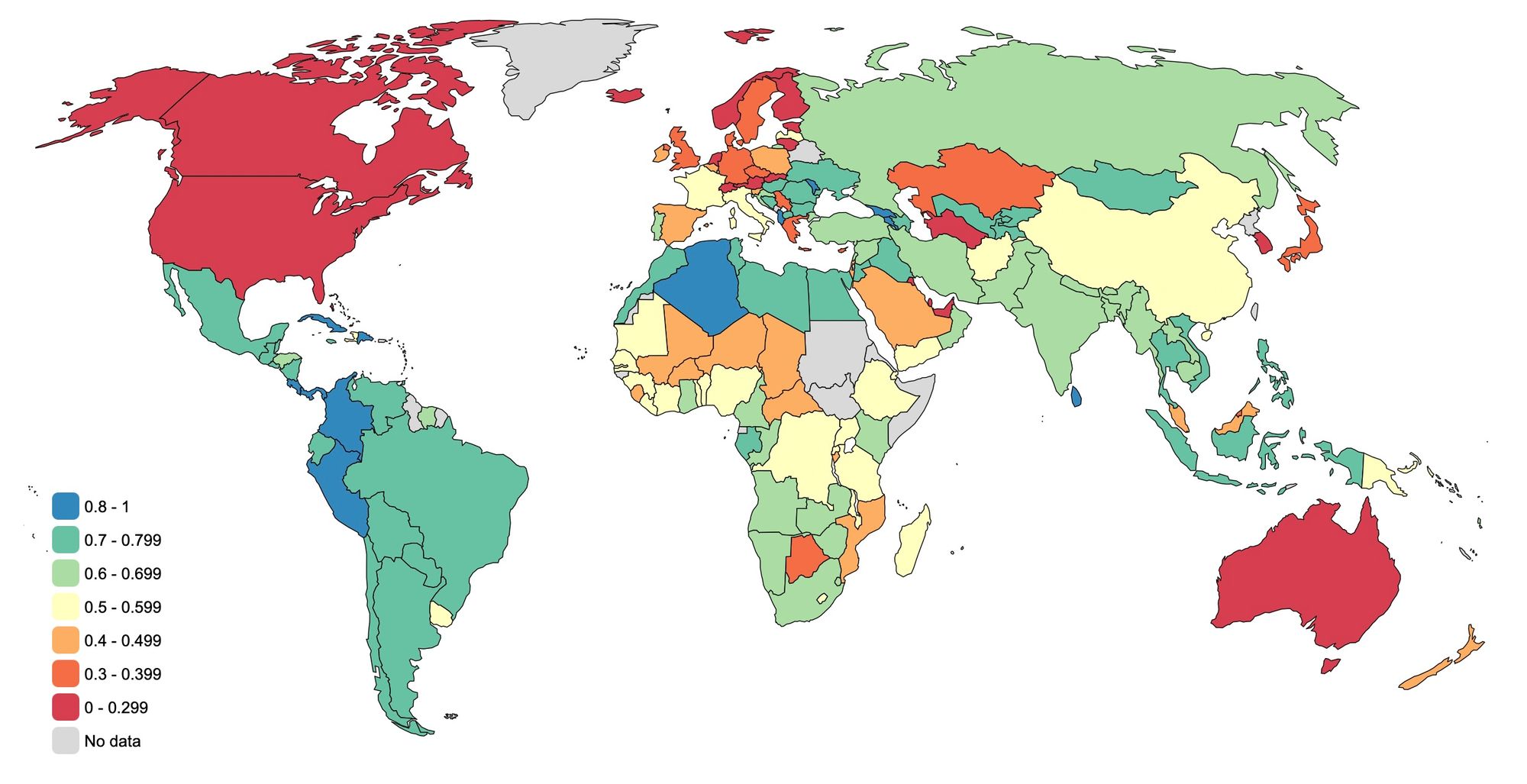
The US, Europe, Australia, et al call themselves rich but, well, that's rich. These countries are so broke that they broke the Earth. The west is driving a leased Bentley, wearing layaway Gucci, all of it acquired by fraud. They might look rich, but their balance sheet looks like shit. In comparison, Sri Lanka or Ghana are rich because we're not underwater.
Once you subtract their climate liabilities, the colonizers have a negative net worth. Hence they're at the bottom of climate-weighted rankings like the Sustainable Development Index, where they belong. These countries call themselves developed, but they're actually frauds. They have embezzled the Earth.
If you do any sane accounting these are not rich countries at all. The US, UK, EU, Canada, Australia, New Zealand, Japan, these place are worth less than zero. These are the poorest places on Earth.
The Accounts Of Nations
In accounting, there's a pretty simple way we measure wealth, and it's not 'do you look like you're balling out?'. It's called a balance sheet. The basic equation is very simple.
Net Worth = Assets - Liabilities
This seems obvious. How much stuff you have minus what you owe. If someone is wearing all Gucci they might seem rich, but that's not actually an asset. If they bought it on a credit card, that's a liability, they're actually poor. This equation is how we measure wealth in individuals and companies, but we somehow ignore it in the wealth of nations. We just talk about GDP, and not what's on the other side of the balance sheet.
In the 1930s and 40s people like Simon Kuznets in the US and John Maynard Keynes started applying accounting ideas to governments, creating national accounts. This is interesting, but also made the sun explode.
Accounting is the (Renaissance) art of measuring everything that matters to a merchant, but you can't just add all that up and get what matters to a nation. You miss all the most important stuff. As Bobby Kennedy said in 1968:
“Gross National Product counts air pollution and cigarette advertising, and ambulances to clear our highways of carnage. It counts special locks for our doors and the jails for the people who break them. It counts the destruction of the redwood and the loss of our natural wonder in chaotic sprawl... Yet the gross national product does not allow for the health of our children, the quality of their education or the joy of their play. It does not include the beauty of our poetry or the strength of our marriages, the intelligence of our public debate or the integrity of our public officials... It measures everything, in short, except that which makes life worthwhile.”
So because we only measure mercantile output, we have ended up with governments that are complete out of balance with human beings and the world. In accounting terms, the books don't balance.
National accounts credit a dead redwood to some loggers account, but they record no debit to the Earth. The Earth is treated as some infinite resource in what you could call an accounting error, or just fraud.
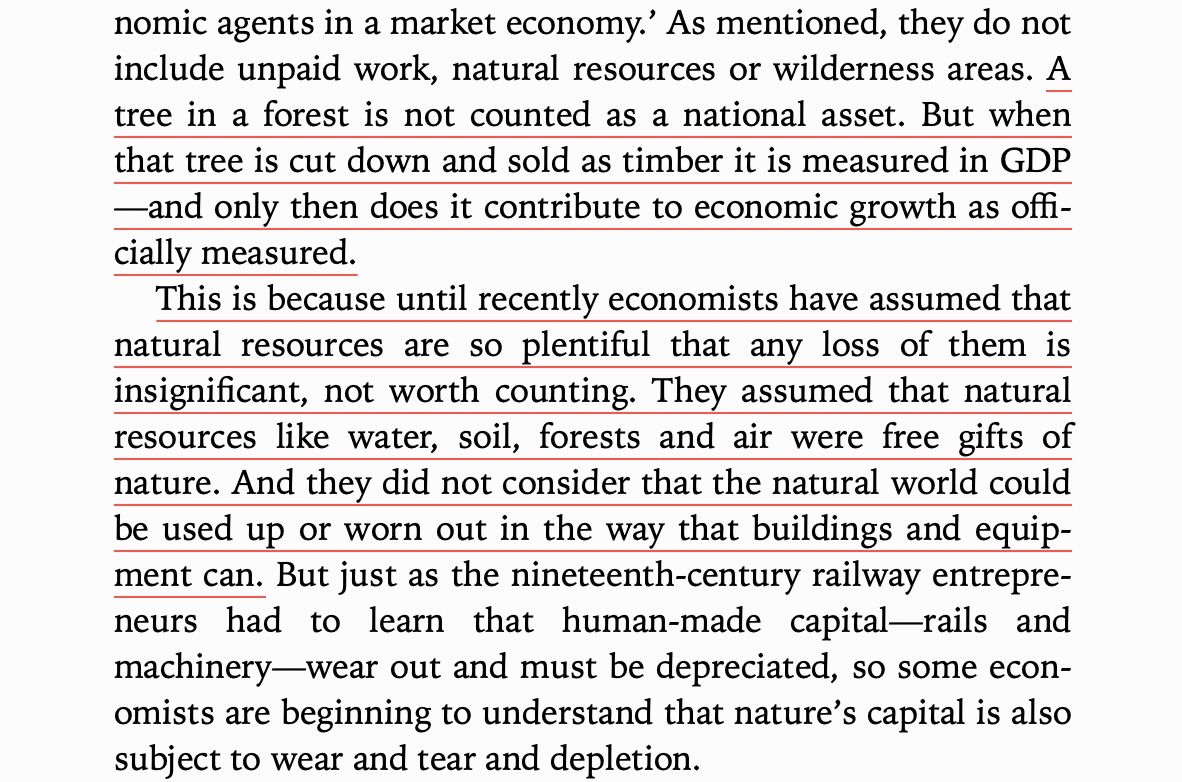
I'll call it fraud, because God knows they're making money on it. The level of fraud, across all of our economy, is staggering. Just take a Big Mac. Economist Raj Patel calculates that the actual cost of a Big Mac should be $200. That's how much cost we're leaving 'off the books'.
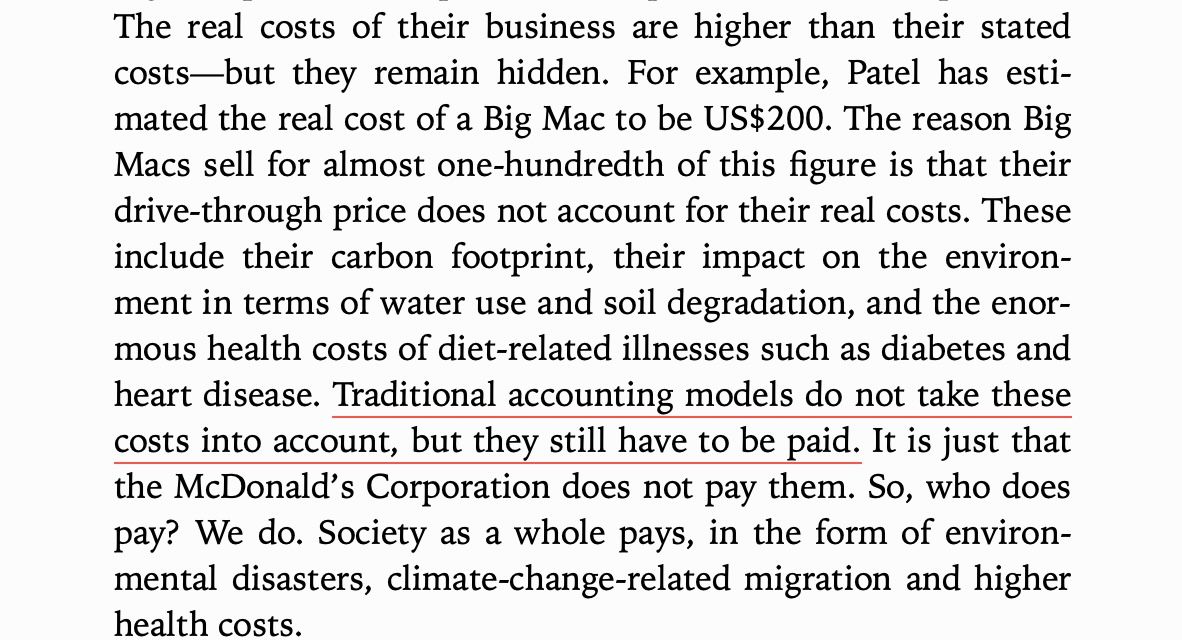
We let them get away with this because we actually believe that GDP belongs to us. We're proud of it. We think we're in on the looting, but we're really not. In America, the richest 50 people hold as much wealth as the entire bottom 50% combined. The wealth is not being shared with you. Per capita is just an accounting fiction, we don't get per shit.
Meanwhile the stuff that actually does belong to us—like the air we breathe, or our relationships, or the places we live—has not been accounted for. They show up in no national accounts. And so they get destroyed. Because we don't count what counts.
This isn't just morally bad, it's bad accounting. Not accounting for costs breaks the most basic principle of double-entry bookkeeping. The double-entry part. If you have a 'credit' like GDP, it has to have a corresponding 'debit' somewhere else. Like out of the environment. For example:

Actually, it's worse than that. Civilization's accounting period is centuries, not quarters, and we are causing damage on that scale. We're not just reducing resources, we're adding toxic resources to the air. We're creating liabilities for our children. We're mortgaging the very cities we live in to the sea.
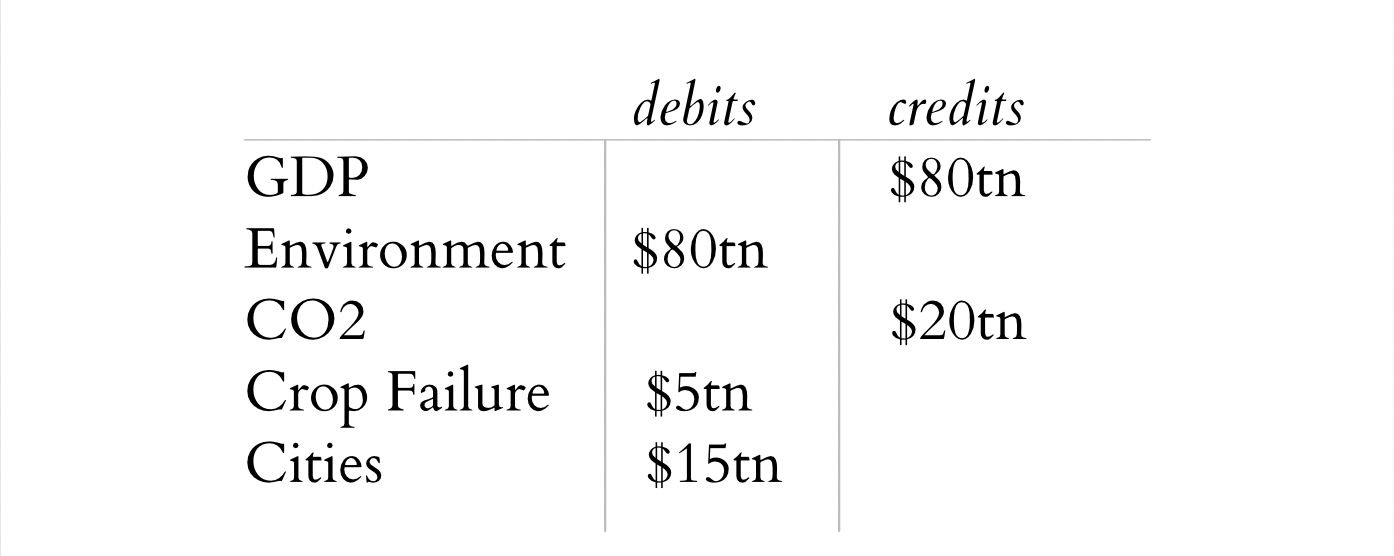
But because we don't balance our books, merrily we whistle along. We just record the GDP going up and up and not everything else going left, right, and sideways. But those things are still happening, whether we record them or not. Nature has a way of balancing all books, in time.
Hence what people like Jane Gleeson-White call for is an immediate change in national accounts. Because while scientists are screaming, economist (effectively priests, honestly) are flying blind.
The Fraud Of Development
The biggest fraud is that we still depend on GDP. GDP is not meant for this purpose. It's like driving by just using the speedometer and not looking out the window. Just ask the people that made it.
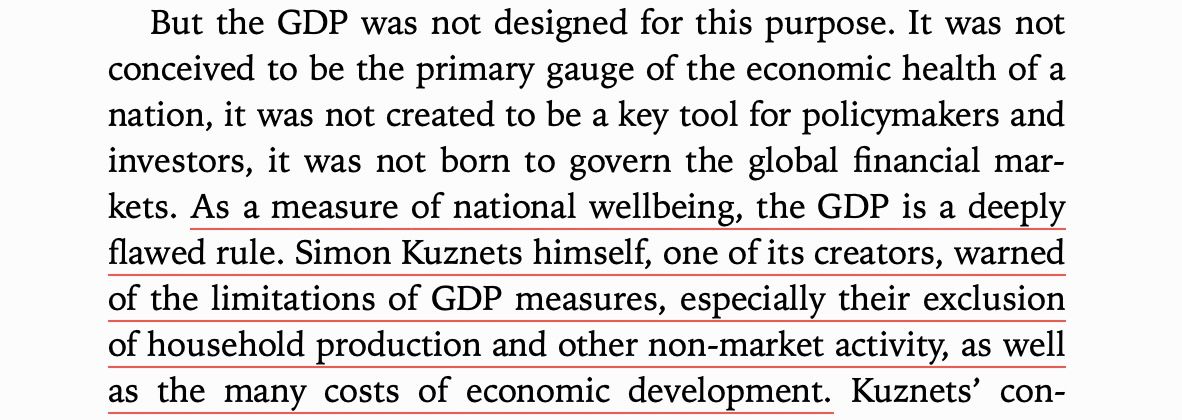
As Bobby Kennedy said, GDP measures everything but that which makes life worthwhile. And so we end up with a few people getting third yachts while we're losing life as we know it. People are still acting like the bill won't come due, but the reality cheque is on the table.
Here's just one bill, itemized by who ordered what. This is global responsibility for climate breakdown.
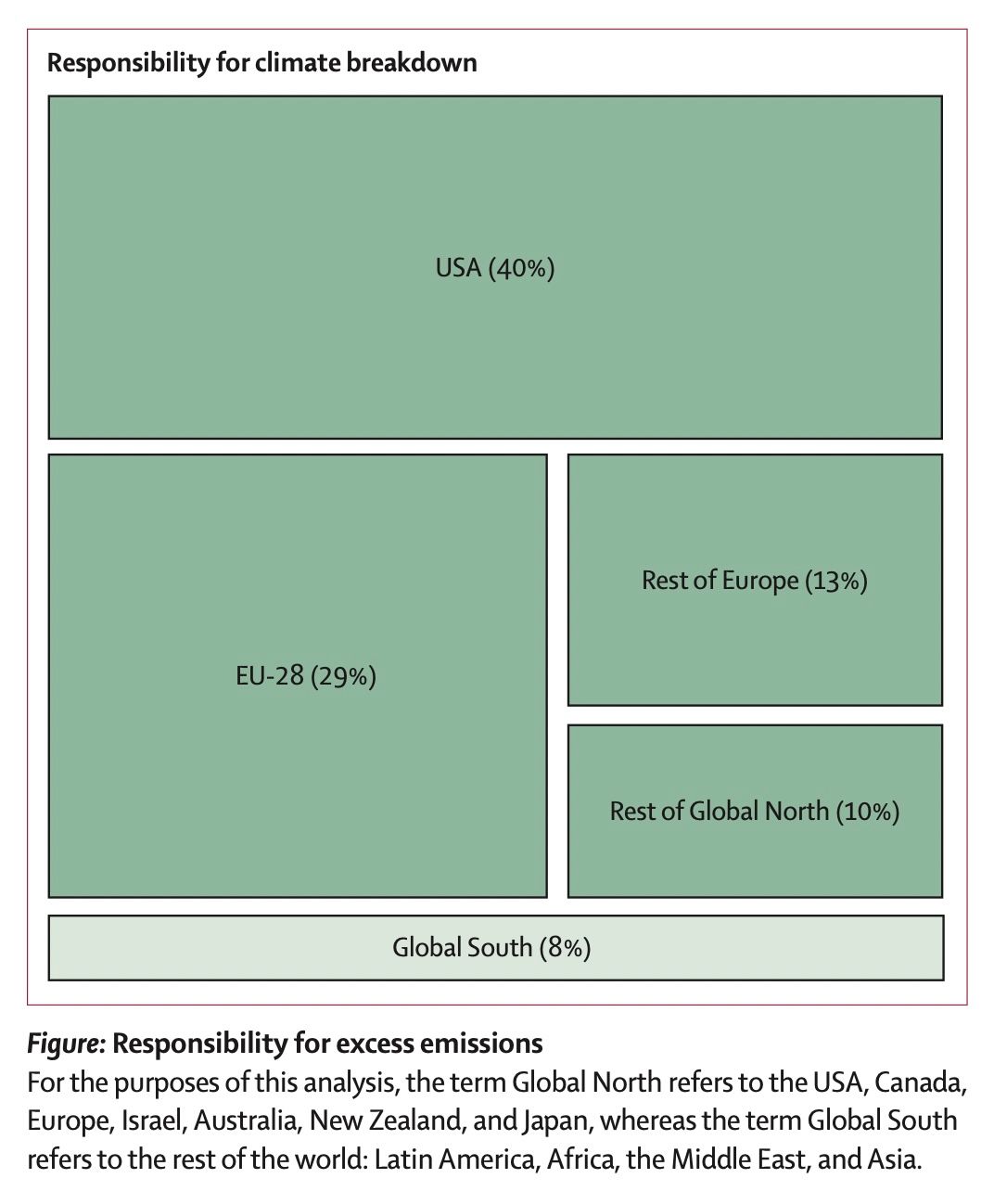
Who ordered the CO2 bottle service? Wasn't me. 92% of excess emissions have been by the colonial minority (the Global North), while the global majority has barely used shit.
Just 100 companies are responsible for 71% of emissions, and they just record profit on their balance sheets. Where's the loss? They've stuck that on us. They've stuck that on unborn children. They've stiffed the world.
A Sample Journal Entry
If there was a real accounting, the books would look like this. Here's a journal entry for the profits of fossil fuel companies, including the costs:

Let me walk you through it. Fossil fuel companies have made $2 trillion since the 1990s. But insurance companies estimate $23 trillion in future losses (a liability). And this is a huge underestimation, our planetary accounting is shit.
How do we balance these two numbers? Well, we have to add $21 trillion to the Pollution account, which is a gigantic liability our children have to deal with. So now all of the profit disappears. It's all liability. It's fraud.
Now repeat these journal entries against all the species we'll lose, the coastlines, every major city, the agriculture, the human suffering and lives. If we did an honest accounting of the world, the cost would be much more than all the economic activity of these 'rich' nations combined. The liabilities they've incurred are effectively infinite. How do you put a price on the livable Earth? On all human life as we know it?
Thus I say that these countries are in no way rich. They are broke. They have broken the world.
Who's Actually Rich?
While the colonial countries are actually underwater, suddenly people that just haven't completely fucked themselves look (relatively) rich. Many countries like Costa Rica, or Sri Lanka, or Panama have achieved long, decent lives without destroying life on Earth.
This is surprising because we don't have a lot of stuff, but remember the guy with the Bentley on lease. We also don't have a lot of liabilities, and it's the balance that counts. And so you get a map like this.
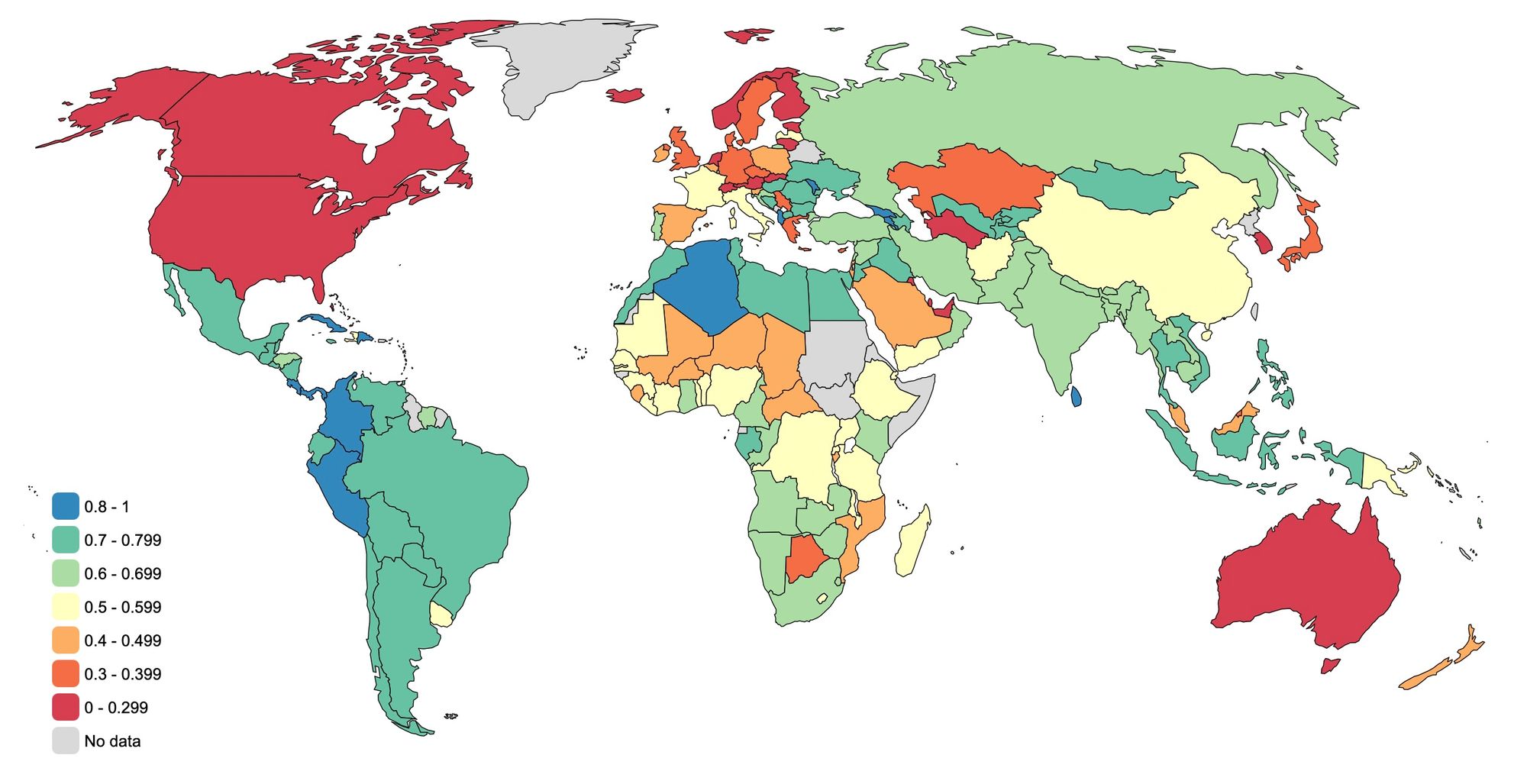
In the SDI, the so-called developed countries are the worst. You have to go down #106 places until you get to a high GDP country (Italy). And this is what they deserve. They're deadbeats. They owe child support to every child yet to be born.
How Do We Develop?
If you look at the world this way, the whole development model falls apart. Why would you follow the broke-ass frauds at the bottom of the list? If we all consumed like them we might ball-out for a minute, but we're effectively microwaving our grandchildren. On a planetary level, we need to learn the difference between assets and liabilities. As Ludacris said,
I can't lie, I'm guilty of splurgin too man
'Til I learned the difference between assets and liabilities
Really important man, I swear
Therefore we must stop following the scrubs in the west and follow the more humble countries that have got quality of life without screwing everyone else. Surprising places like the communist governments of Kerala, India or Cuba, or the indigenous leadership of Bolivia, or whatever they're doing in Georgia (the country). These are the truly rich places, while the flashy western world is a big fraud.
If you learned something from this, I invite you to sign up for a paid newsletter plan, to balance my books lol.
I highly recommend Jane Gleeson-White's book Double-Entry. It's a fascinating story of accounting, which sounds impossible, but modern accounting was popularized by Luca Pacioli, a friend of Leonardo Da Vinci's, who illustrated some of his works. Pacioli has actually been more influential than Da Vinci, since every company uses his algorithm and accounting shapes how and what we value in the world. She goes from 7000 BC to our crashing future and it's an excellent read. I bought it, but here's a LibGen link if you just want to get it from the global librar.
*I use debit/credit in the conventional sense of negative/positive, but that's not how it's used in actual accounting. They're just words and they mean up or down for different accounts. For example, you debit a cash account to increase it.